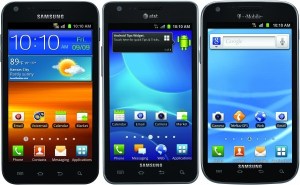
Samsung may be in the midst of ramping up its legal battle with Apple, but the company is also taking a little time out to toot it’s own horn: the company announced today that global sales of its Galaxy S II smartphones have passed 10 million units. The company is careful in its release to note the figures represent channel sales, rather than merely units shipped to retailers—Samsung got in trouble earlier this year over its characterization of Galaxy Tab sales.
“Since its launch in late April 2011, the Galaxy S II has seen continued sales success, demonstrating Samsung’s industry-leading capabilities in—and commitment to—the smartphone market” said Samsung’s president and mobile communications chief JK Shin, in a statement. “In just five months the Galaxy S II has seen tremendous growth, reflecting its tremendous popularity with customers around the world, who in selecting the Galaxy S II as their device of choice have driven the device’s strong market position globally.”
Selling 10 million units in nearly five months is a considerably achievement for almost any handset on the market—unless that handset is the iPhone 4, which sold more than double that number in the third fiscal quarter of 2011. However, Samsung’s sales figures are impressive because they seem to indicate a continued strong demand for the Galaxy S II—the company managed to sell 5 million unit during the phone’s two months of availability, and a similar number during the second two months. Furthermore, the Galaxy S II is not yet a significant contender in the United States market, which could give it plenty of room for sales expansion—assuming Samsung can sidestep Apple’s request for an injunction.
The Galaxy S II is one of a selection of Samsung phones that may be barred from sale in Europe by a temporary injunction granted to Apple: that injunction is scheduled to go into effect October 15. Interestingly, that injunction applies to the devices’ use of Android 2.3, and wouldn’t hold if the phones shifted to Android 3.0 Honeycomb.
Editors' Recommendations
- Every Samsung gadget we still expect in 2024
- Samsung Galaxy Ring: news, rumored price, release date, and more
- Flash sale gets you this iPad Mini-sized Samsung tablet for $99
- Best Samsung Galaxy Z Flip 5 deals: Get the foldable for free
- The 20 best Samsung Galaxy Watch faces you should be using


